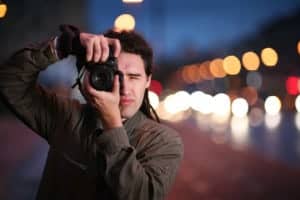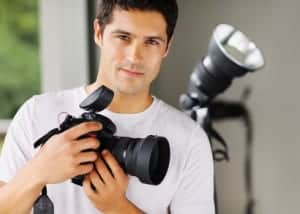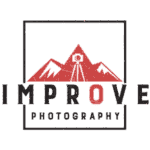
On a daily basis, I work with amateur photographers who are considering the jump to becoming a professional photographer as either a part-time “side job” or as a full-fledged career photographer. Almost without exception, they ask three questions, (1) Can you help me with my lighting, (2) How can I get more clients, and (3) How do I know if now is the right time?
Well…
[insert drumroll sound here] I am coming out with a DVD in December that will answer the first two questions in great detail [insert crash of cymbals and clapping sound here], but this article will focus on the third question: How do you know when to hang up your shingle and become a pro?
The answer to this question depends DRASTICALLY on your individual situation and what type of photography business you want to run. If you have a good job and are considering opening up a studio, buying a lot of equipment, and make major investments in traditional advertising, then your decision to go pro may be a very scary one since you stand to lose a lot of money. On the other end of the spectrum, a stay-at-home mom who has basic flash photography gear and wants to open an on-location baby photography business has few obstacles to launching the new venture.
No matter what your current situation, I think there are three rules that you need to consider before you hang up your shingle.

Rule #1: Never open up shop until multiple non-family and non-friends ask to buy your photos or pay you to photograph them.
I worded this rule carefully, because I received many MANY emails from photographers saying their family members or friends love their work and they keep getting compliments, so they send me their portfolio for a little review. While I always try to be positive in my response, I usually find that only 5% or less of those people actually have photos that rise to the professional level. Very very good, but not quite professional.
So, my recommendation is always to wait until multiple non-friends and non-family members ask to buy your photos or ask to pay you to photograph them.
Rule #2: Don't Hang Up Your Shingle When You're Desperate
Again, your current financial situation and your investment in gear will largely determine the answer to this question. When I started earning money with my photography, I had a family to support, no savings, and zero money to invest into the business. It was a great blessing to me and my family that we were able to make photography work out for us, but I always warn photographers about going pro when they are already financially strapped.
While some are able to succeed more quickly, I think it is realistic to say that it would take most photographers a year of hard work and dedication before photography could be a sustainable full-time job.

Rule #3: Don't go pro unless you have the business and marketing skills that are necessary
I have recently heard from quite a few advanced amateur photographers who are considering getting a college degree in photography in order to become a professional photographer. My response: “HUH!?!?!?” Honestly, all you need to know about photography can be learned by diligently studying online and spending a lot of time practicing with your camera.
There are many terrific photographers who I would never recommend to go pro. The reason is that they simply don't have the business background and marketing skills. If you don't know how to create an LLC, optimize a website for SEO, market yourself with social media, handle contracts, etc….. you'll be at a serious disadvantage in creating your business. Clearly, all these things are learnable, but you need to ask yourself seriously if you have what it takes.
I can honestly say that I did not know enough about business or marketing when I started getting paid for my photography, but I had the drive to learn the skills, and that has made a huge difference for me.
My experience as a pro photographer
At first, I was the $50 photographer on Craigslist. I admit it, but I'm not ashamed of it because I was just doing the best I could to take care of my family during college. I was SO EXCITED when the first person paid me to shoot their event. I produced very nice pictures, but looking back, I can certainly say that it was not professional-quality work. I sold cheap because I was a starving college student and I wanted to provide more for my family.
Then, I decided to get serious about my photography, so I stopped doing paid work for a while and just focused on what I love: landscape photography. I shot almost every weekend and once or twice during the week. As soon as my family went to sleep at night, I'd head out and do some night photography so I could learn more without missing out on family time. I learned a TON and finally started to get a few requests to purchase my photos (one of the first pictures I ever sold is below).
It was at this time that I also invested in some basic lighting gear and began spending a lot of time reading everything I could about lighting. Once I applied proper lighting techniques to my portraits, I finally started to see professional results. It wasn't the camera, or the lens, or the pose, or anything else. What was missing in my photos was the light!
It was only at this point that I started earning real money from my photography. Instead of charging $50 for a 2-hour shoot, I was often earned over $1,000 for a 2-hour shoot. I hope it doesn't sound presumptious to talk about money here, because I believe that the only reason this worked out for me is because I had prayed for so long to find a way to provide better for my family.
Anyway, I started setting up quite a few shoots and booking clients more and more often. Then…. I quit. I came home from a shoot one evening and I was exhausted. It wasn't fun anymore! I was grateful for the income, but I earned it at the expense of my passion for photography.
I sat down with my wife that night and asked for her advice. I wasn't sure what to do, because I knew it was nearly impossible to survive selling landscape photography. My dear wife always knows what I need before I need it, and she offered me valuable counsel on how I could fix the problem of hating the work, but needing the money and not wanting to destroy my hobby.
For me, the answer was becoming a photography instructor. I began teaching in-person workshops and did so for a long time. Many loyal readers of the site are friends that I made while teaching photography workshops. I still teach some workshops, but ImprovePhotography.com has given me the ability to teach several thousand photographers per day, which has been even better. Also, it has allowed me to continue to expand my knowledge of photography while working on my own schedule.
Thank you all for being loyal readers of ImprovePhotography. I hope your venture as a professional photographer or a passionate amateur is as enjoyable as mine is.


when u add $ to something u love,well,it takes away…..Peter great article JIM!!!!!!! Passion WINZ